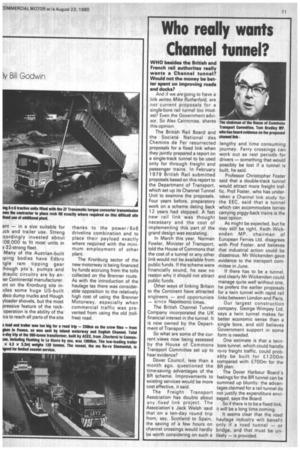Who really wants Channel tunnel?
Page 73

If you've noticed an error in this article please click here to report it so we can fix it.
WHO besides the British and French rail authorites really wants a Channel tunnel? Would not the money be better spent on improving roads and docks?
And if we are going to have a link writes Mike Rutherford, are not current proposals for a single-bore rail tunnel too modest? Even the Government advisor, Sir Alex Cairncross, shares this opinion..
The British Rail Board and the Societe National des Chemins de Fer resurrected proposals for a fixed link when they jointly prepared a report on a single-track tunnel to be used only for through freight and passenger trains. In February 1979 British Rail submitted proposals based on this report to the Department of Transport, which set up its Channel Tunnel Unit to examine the proposals. Four years before, preparatory work on a scheme dating back 12 years had stopped. A fast new rail link was thought necessary and the cost of implementing this part of the grand design was escalating.
In March this year, Norman Fowler, Minister of Transport, told the House of Commons that the cost of a tunnel or any other link would not be available from public funds. If the scheme were financially sound, he saw no reason why it should not attract public funds.
Other ways of linking Britain to the Continent have attracted engineers — and opportunists ._. since Napoleonic times.
The British Channel Tunnel Company incorporated the UK financial interest in the tunnel. It is now owned by the Department of Transport So what are some of the current views now being assessed by the House of Commons Transport Committee set up to hear evidence?
Dover Council, less than a month ago, questioned the time-saving advantages of the BR scheme. Improvements to existing services would be more cost effective, it said.
The Freight Transport Association has doubts about any fixed link project. The Association's Jack Welsh said that on a ten-day round trip from, say, Scotland to Spain, the saving of a few hours on channel crossings would hardly be worth considering on such a
lengthy and time consuming journey. Ferry crossings can work out as rest periods for drivers — something that would possibly be lost if a tunnel is built, he said.
Professor Christopher Foster said that a double-track tunnel would attract more freight traffic. Prof Foster, who has undertaken a Channel link study for the EEC, said that a tunnel which can accommodate lorries carrying piggy-back trains is the best option.
As might be expected, but he may still be right, Keith Wickenden MP, chairman of European Ferries Ltd, disagrees with Prof Foster, and believes that industrial action could be disastrous. Mr Wickenden gave evidence to the transport committee in June.
If there has to be a tunnel, and clearly Mr Wickenden could manage quite well without one, he prefers the earlier proposals for a twin tunnel with rapid rail links between London and Paris.
Our largest construction company, George Wimpey Ltd, says a twin tunnel makes far better economic sense than a single bore, and still believes Government support in some form is needed.
One estimate is that a twinbore tunnel, which could handle ro-ro freight traffic, could probably be built for £1200m compared with £700m for the BR plan.
The Dover Harbour Board's feelings for the BR tunnel can be summed up bluntly: the advantages claimed for a rail tunnel do not justify the expenditure envisaged, says the Board.
So if there is to be a fixed link, it will be a long time coming.
It seems clear that the road haulage industry will benefit only if a road tunnel — or bridge, and that must be unlikely — is provided.




















































































































